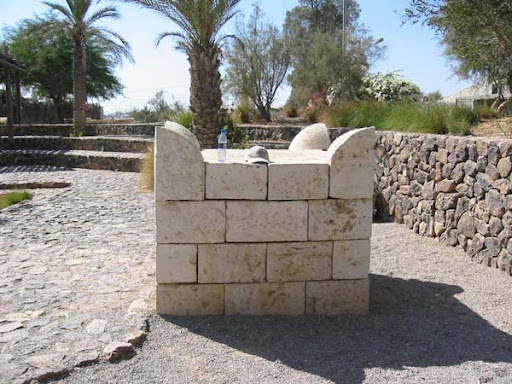6:1 – Can Ezekiel speak apart from the word of the LORD coming to Him? (cf. 7:1; and see 3:27)
6:2 – “set your face against the mountains of Israel”? Perhaps this has reference to the “high places” (6:3, 13) though the “high places” could also be in the valleys. More likely it is a judgment against the land (as the king, people, and temple are also judged).
6:3 – “hear the word of the Sovereign LORD” as a prophetic introduction see Josh.3:9; 1 Sam.15:1; 2 Kings 7:1; 20:5; Amos 7:16; Isa.1:10; 28:14, 16.
6:4-7 – What is the reason the LORD gives for why He will do what He pronounces: You will know that I am Yahweh. He will show the idols and sacred places to be worthless and those who worship such to be as what they worship (cf. Ps.135:15-18). The word for “idols” (Heb. gillulim) is not the normal term, but one of derision for the worthlessness of the idols basically identifying them with excrement (Block NICOT 226). “Scatter the bones around your altars” implies that they will surround the altars they have already surrounded but instead of dancing and worship it will be as the dead and judged (Duguid NIVAC 108)
6:8-10 – Those who are scattered exiles will be those sanctified by the LORD and not those who remain in the land. God’s judgment means ultimate redemption. Dan Block (NICOT 231-233) notes three things the remnant exiles will do: 1) remember the LORD; 2) loathe themselves; and 3) “know that I am Yahweh” (6:13-14; 7:4, 9, 27). This last phrase is key to the whole of the prophecy (cf. Exo.14:4, 18).
6:11 – “Strike your hands together” (or “clap your hands”)? This is as a sign of God’s anger with Israel (see Num.24:10; Eze.21:14, 17; 22:13). He is also told “stomp your feet” which is a sign of condemnation and rejection. “Alas!” does not convey the more direct translational value of “Ah!” (the sound of a disgusted sigh).
6:12 – Is there any escaping from the LORD? (see Ps.139)
6:13-14 – The irony is that “rather than offering life to the devotees, the pagan sanctuaries have become symbols of death” (Block NICOT 237). “From the desert to Diblah” (should read “Riblah” – the ‘d’ and ‘r’ look almost identical in Hebrew) means from the south to the very far north the LORD will desolate everywhere.
7:2-6 – “The end…”? What does this mean? Also, is the LORD’s judgment just? In what manner will He judge? Is the end “coming” or has it “come” already? Why will God not have pity?
7:10, 12, 17, 19 – The “day” of the LORD is the “moment of his intervention in human history, with the outcomes of such interventions being determined by him alone” (Block NICOT 244).
7:10-13 – Note the agricultural and commercial irony. What relation does “blossoming”, “budding” and the “staff” have to Aaron’s staff in Num.17:8?
7:14 – What is this verse referring to? Nebuchadrezzar’s approach and Jerusalem’s fall. Why is everyone judged? Were all of Israel wicked? Why do the righteous suffer with the wicked?
7:15-18 – Where is escape? It is of interest that those who escape do so to the mountains (cf. Mt.24:16; Mk.13:15; Lk.21:21). Are those who survive going to rejoice? Why not? What are the expressions in vs.17 meant to express? Apparently an utter lack of composure (the LXX and most modern commentators understand this to suggest they will wet themselves).
7:19 – What good is gold and silver in the day of the LORD’s wrath?
7:20-22 – The “beautiful jewelry” may suggest (following Rabbis Rashi and Kimchi) the treasures of the temple (7:22-23) which would make the acts of Israel that much worse. How might the treasury be “defiled” and “desecrated”? “The wicked of the earth” are used as God’s hand of judgment. John Calvin in his commentary on Ezekiel wrote concerning this, “They are borne along by a depraved disposition, but God has a wonderful plan, incomprehensible to us, according to which he impels the wicked here and there—without becoming involved in their guilt (cited in Duguid NIVAC 122).
7:23-24 – Who is the LORD telling to “prepare chains”? What is the reason? (cf. Gen.6:11) Note that the LORD says, “I will…” concerning the judgment (see who “strikes the blow” in 7:9).
7:25-27 – “They will seek peace but…” there will be no help for anyone. “Then they will know…”? (cf. 2 Pet.3:3-4)

